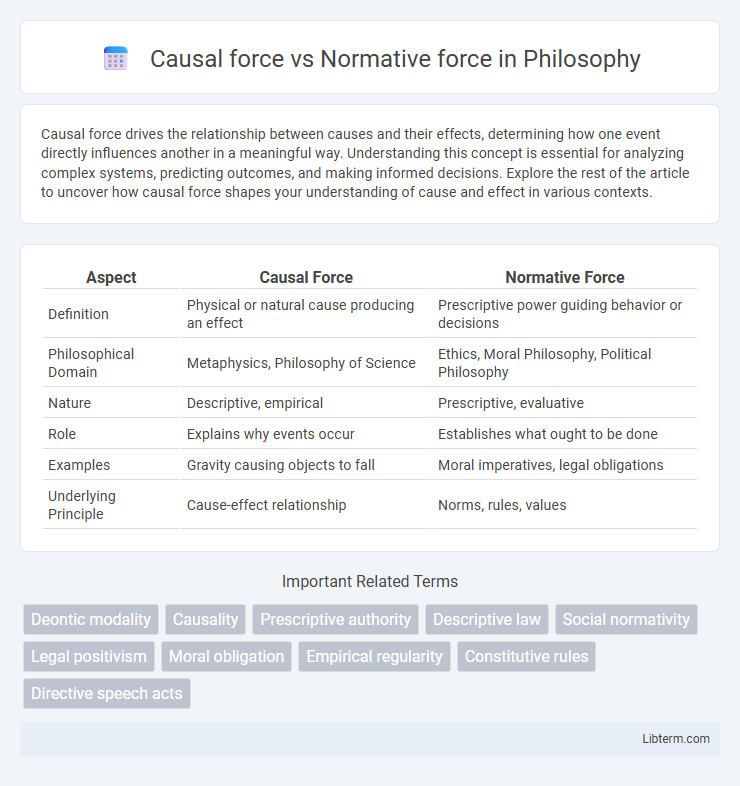Causal force drives the relationship between causes and their effects, determining how one event directly influences another in a meaningful way. Understanding this concept is essential for analyzing complex systems, predicting outcomes, and making informed decisions. Explore the rest of the article to uncover how causal force shapes your understanding of cause and effect in various contexts.
Table of Comparison
| Aspect | Causal Force | Normative Force |
|---|---|---|
| Definition | Physical or natural cause producing an effect | Prescriptive power guiding behavior or decisions |
| Philosophical Domain | Metaphysics, Philosophy of Science | Ethics, Moral Philosophy, Political Philosophy |
| Nature | Descriptive, empirical | Prescriptive, evaluative |
| Role | Explains why events occur | Establishes what ought to be done |
| Examples | Gravity causing objects to fall | Moral imperatives, legal obligations |
| Underlying Principle | Cause-effect relationship | Norms, rules, values |
Defining Causal Force and Normative Force
Causal force refers to the power or influence that causes events or outcomes to occur, grounded in empirical evidence and observable relationships. Normative force represents the compelling authority of norms, rules, or values that guide behavior based on what ought to be done rather than what is. Understanding the distinction involves recognizing that causal force explains why things happen, while normative force prescribes how things should happen.
Origins and Philosophical Foundations
Causal force originates from empirical observation and the principle of cause and effect, deeply rooted in the scientific method and metaphysical determinism established by philosophers such as David Hume and Isaac Newton. Normative force derives from moral philosophy and ethical frameworks, drawing on Kantian deontology, social contract theory by Thomas Hobbes and John Locke, and the evolution of legal positivism. These philosophical foundations highlight the distinction between descriptive causal relationships and prescriptive normative obligations shaping human behavior and societal rules.
Core Characteristics of Causal Force
Causal force refers to the power or influence that causes an effect or change in a system, defined by its direct relationship with physical or behavioral outcomes. Core characteristics include its empirical measurability, predictability based on natural laws or established mechanisms, and its role in producing observable consequences without requiring moral or ethical judgment. Unlike normative force, which prescribes how things should be according to values or rules, causal force operates within the realm of cause-and-effect dynamics inherent in reality.
Core Characteristics of Normative Force
Normative force fundamentally shapes behavior by establishing standards, obligations, and duties that guide decision-making and social interactions. It derives authority from moral, legal, or social norms compelling individuals to conform to prescribed rules rather than merely responding to cause-and-effect relationships. Unlike causal force, which influences outcomes through physical or empirical mechanisms, normative force operates through legitimacy, social acceptance, and ethical considerations embedded in cultural or institutional frameworks.
Differences Between Causal and Normative Explanations
Causal explanations identify factors or events that directly bring about an outcome, focusing on cause-and-effect relationships rooted in empirical evidence. Normative explanations, in contrast, justify or prescribe behaviors, decisions, or social norms based on values, ethics, or standards rather than observable cause-effect links. The primary difference lies in causal force explaining why something happens, while normative force explains why something ought to happen.
Intersections: Where Causal and Normative Forces Overlap
Causal force refers to mechanisms that produce specific outcomes through cause-and-effect relationships, while normative force involves influences shaped by moral or societal norms guiding behavior. Intersections arise when causal factors underpin normative systems, such as laws that both cause compliance through enforcement and embody shared ethical standards. This overlap highlights how empirical realities and normative frameworks co-construct social order and drive human actions.
Causal Force in Scientific Inquiry
Causal force in scientific inquiry refers to the relationship between cause and effect, where a specific factor directly influences a particular outcome or phenomenon. Understanding causal mechanisms enables researchers to establish empirical evidence and make predictions based on observed variables. This differs from normative force, which pertains to values, ethics, or prescriptive guidelines rather than objective cause-and-effect relationships.
Normative Force in Ethics and Law
Normative force in ethics and law refers to the binding power of moral principles and legal rules that guide and regulate behavior by establishing standards of right and wrong. It shapes obligations, duties, and rights, compelling individuals and institutions to act in accordance with prescribed norms and ensuring social order. Unlike causal force, which describes the effect of actions, normative force embodies the authority that justifies enforcement and adherence within ethical frameworks and legal systems.
Real-World Examples Illustrating Both Forces
Causal force is exemplified by natural phenomena such as gravity causing objects to fall, demonstrating direct cause-and-effect relationships, whereas normative force governs behavior through societal rules like traffic laws mandating stops at red lights to ensure safety. In legal systems, courts enforce normative force by interpreting laws and imposing penalties for violations, while the physical consequence of a speeding car crashing illustrates causal force in action. Workplace policies provide normative force by requiring employees to follow codes of conduct, contrasting with causal force when ergonomic hazards physically impact workers' health.
Implications for Theory and Practice
Causal force describes how factors produce effects, emphasizing empirical relationships critical for scientific theory validation and practical intervention design. Normative force involves value-based directives that guide behavior, shaping ethical frameworks essential in policy-making and organizational leadership. Understanding the distinction allows theorists to create models that explain phenomena accurately while practitioners implement guidelines aligned with societal values and ethical standards.
Causal force Infographic

 libterm.com
libterm.com